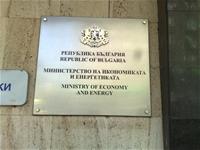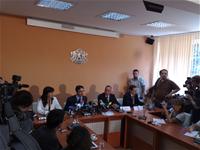MEET: Publicity of the energy contracts? May be
Adelina Marini, August 3, 2009
 Whether it is possible some energy contracts with the participation of Bulgaria to become public will be decided after a thorough legal analysis. This is what the new Bulgarian energy minister Traycho Traykov said in response to a question of euinside during his first meeting with journalists, where he presented his first impressions after a week on the post. The issue with the publicity of the energy contracts, especially those, signed by the former energy minister Rumen Ovcharov, became very pressing in January when because of a dispute between Russia and Ukraine, Bulgaria was left without natural gas deliveries for almost a month. The it became clear that our country cannot get any compensations for this.
Whether it is possible some energy contracts with the participation of Bulgaria to become public will be decided after a thorough legal analysis. This is what the new Bulgarian energy minister Traycho Traykov said in response to a question of euinside during his first meeting with journalists, where he presented his first impressions after a week on the post. The issue with the publicity of the energy contracts, especially those, signed by the former energy minister Rumen Ovcharov, became very pressing in January when because of a dispute between Russia and Ukraine, Bulgaria was left without natural gas deliveries for almost a month. The it became clear that our country cannot get any compensations for this.
The new minister, responsible for energy, economy and tourism said: "I think that everything that is possible to become public and what is in the legitimate interest of citizens, will be made communicated with them after a legal analysis".
The first thing about which Mr. Traykov announced his initial views after a week on the job was the construction of the second nuclear power station"Belene". In spite the determined signals the prime minister Boyko Borisov gave before the elections that the construction will be frozen, for now  the new energy minister is cautious in his estimations. To listen to the position of the new minister on key energy projects today came not only an awful lot of Bulgarian journalists but also the correspondents of the biggest Russian media, based in Bulgaria. Traycho Traykov also explained that work on the "Belene" project has been so far done a piece without any view for its economic profitableness. There are also some uncertainties regarding the penalties which Bulgaria will have to pay in case it freezes the construction work because of the many contracts with the secondary contractors.
the new energy minister is cautious in his estimations. To listen to the position of the new minister on key energy projects today came not only an awful lot of Bulgarian journalists but also the correspondents of the biggest Russian media, based in Bulgaria. Traycho Traykov also explained that work on the "Belene" project has been so far done a piece without any view for its economic profitableness. There are also some uncertainties regarding the penalties which Bulgaria will have to pay in case it freezes the construction work because of the many contracts with the secondary contractors.
What is clear for the moment is that so far on the project some 400 mn euro have been spent. "This sum is quite enough for the increase of the energy efficiency of all buildings in Sofia (the capital of Sofia with estimated population of over 2.5 mn people of the overall 7 mn population of Bulgaria), and that makes the construction of such a power capacity useless", Mr. Traykov added. There are still a lot of analysis to be made and a lot of meetings with partners of the National Electricity company as well as with subcontractors. The first meeting will be yet this week with the German partner of the NEC - RWE with the participation of the prime minister Boyko Borisov himself. Only after those meetings and estimations will be possible answers to be given to the key questions which every normal investor should have asked before starting a project: "Does Bulgaria need such a generating power capacity? How much will the energy it produces cost and is there a market for this energy? What are the engagements that the National Electricity Company has already taken and what are the options for further actions".